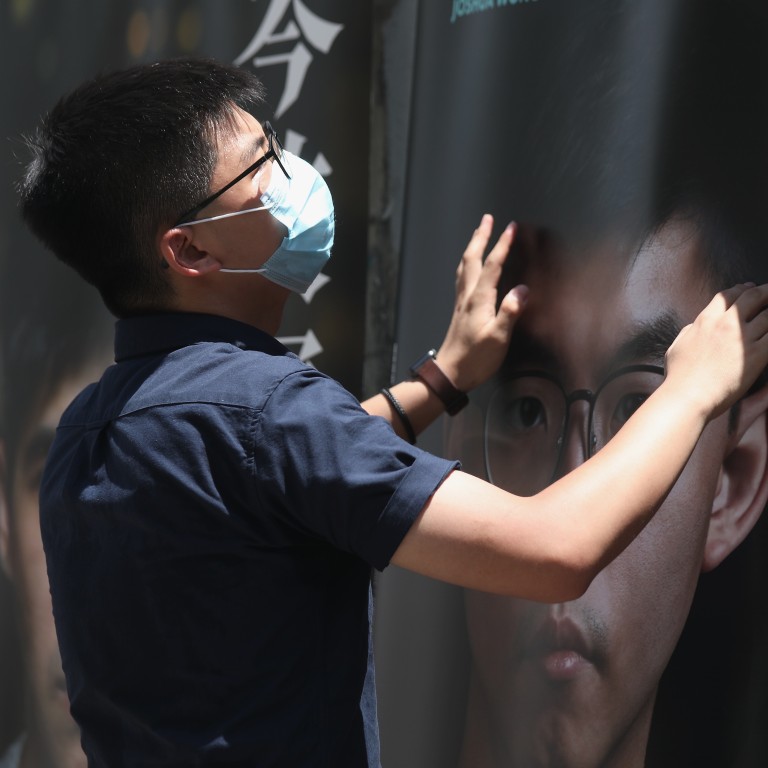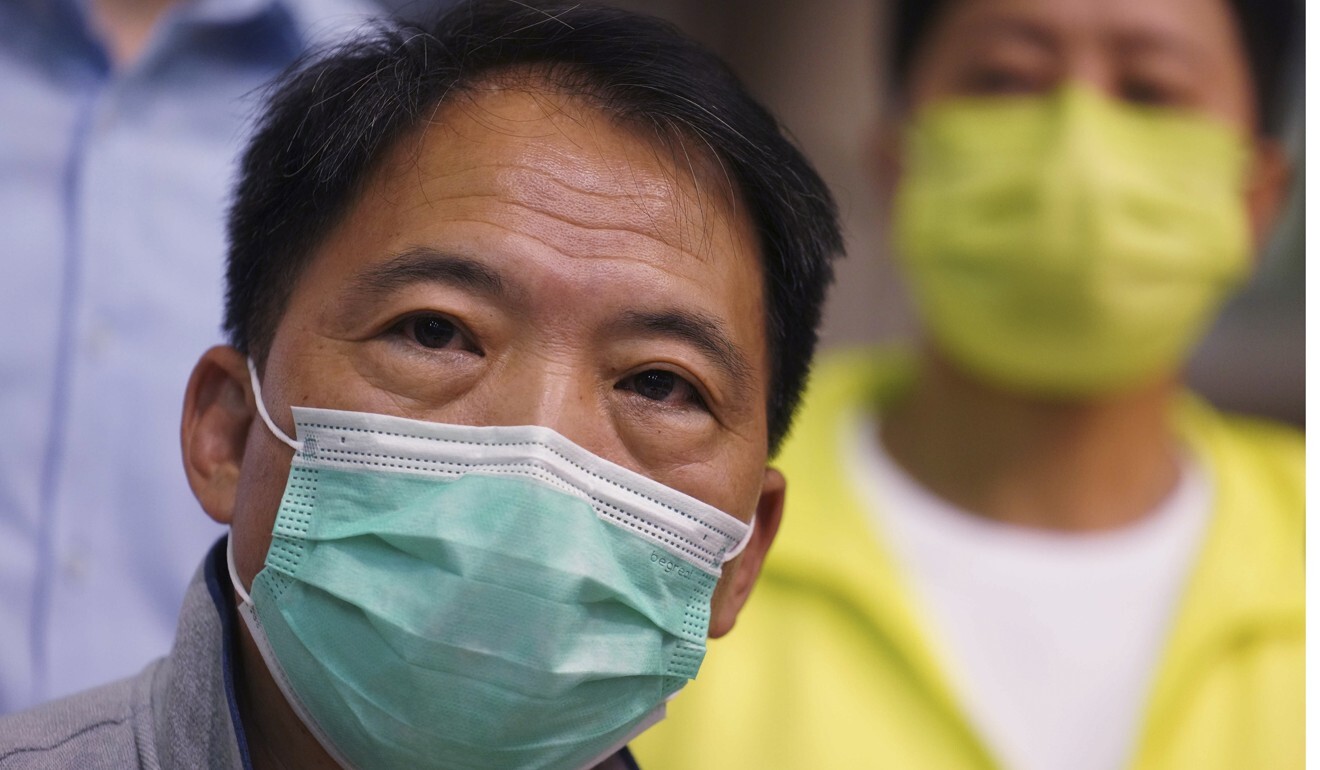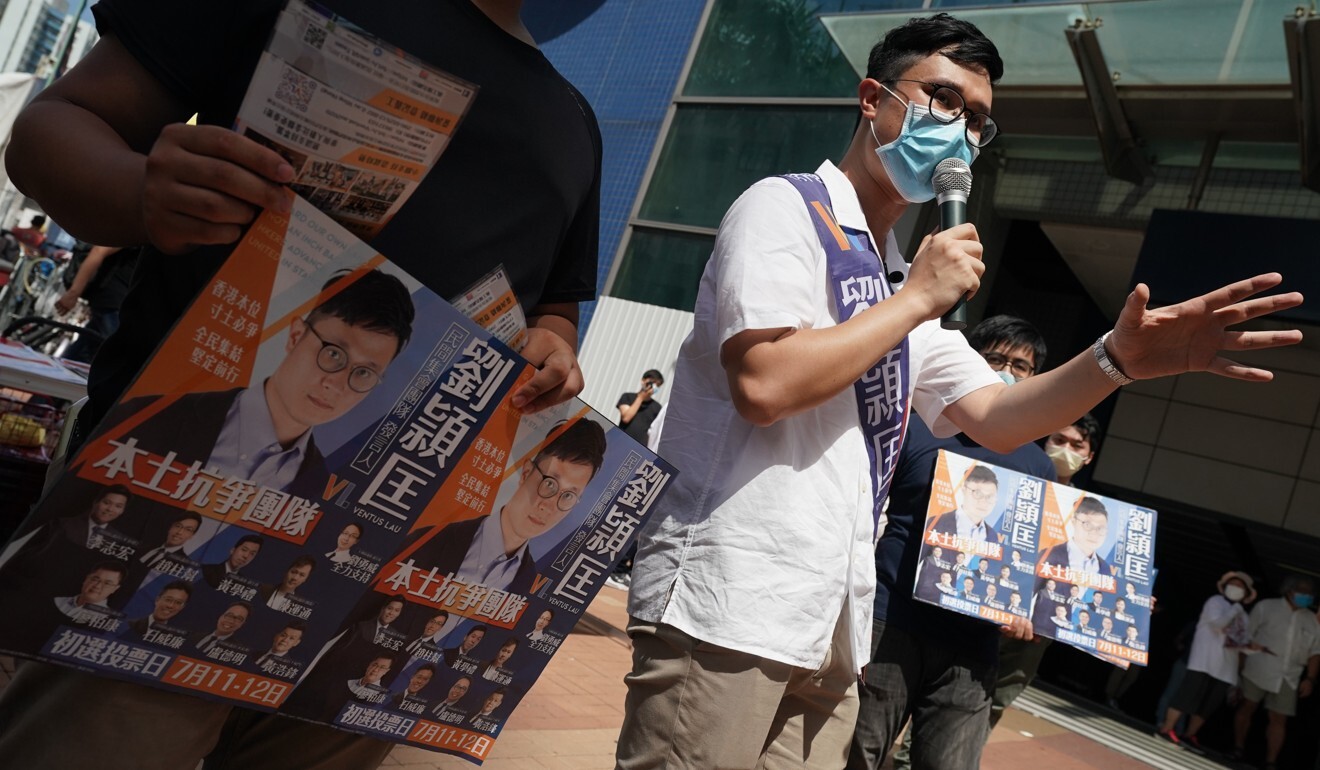
Signing declaration of allegiance a non-starter for Joshua Wong, other candidate hopefuls for September’s Hong Kong elections
- On heels of successful primary, city’s opposition camp finds itself divided on question of signing a form pledging allegiance to the city and its Basic Law
- Former Demosisto leader warns placing too much emphasis on a candidate’s decision is a ‘trap to undermine unity’
More opposition hopefuls, including activist Joshua Wong Chi-fung, made it clear they do not intend to sign a form pledging to uphold Hong Kong’s Basic Law and allegiance to the city as the nominating window for the coming Legislative Council elections kicked off on Saturday.
Their defiance, which could put them at risk of being disqualified, comes as Beijing’s mouthpiece urged Hongkongers not to support opposition candidates with a “scorched-earth mentality” who would seek to cripple the government should they win.
Explainer: Hong Kong elections: Beijing’s fury, chilling effect and uncertainty loom after opposition’s unofficial polls
The opening day of the nomination period for the September polls saw 18 candidate lists returned by opposition and pro-establishment parties as well as independent hopefuls.
The city’s opposition camp has so far been split on the question of whether to sign the declaration form, which was introduced by the government four years ago.

While some localists had earlier indicated a willingness to sign – as they did ahead of last year’s district council elections to avoid disqualification for “technical reasons” – some have also called on a united opposition to demonstrate its will to fight.
Democratic Party chairman Wu Chi-wai and two candidates from the People Power party on Wednesday became the first to publicly say they would not sign the declaration form, despite lawyers warning they could be disqualified under the new national security law.
As a disqualified runner, I know very well that whether Beijing approves me to run or not does not hinge on whether I have signed the form.
They were joined by localist district councillor Owen Chow Ka-shing on Friday night. Wong, who quit his Demosisto party when the security law was adopted on June 30, followed suit on Saturday evening, along with student leader-turned district councillor Lester Shum.
“As a disqualified runner, I know very well that whether Beijing approves me to run or not does not hinge on whether I have signed the form. It is instead a matter of national policy and diplomacy,” Wong wrote in a Facebook post.
“Signing or not will not affect my chances of getting candidacy approved,” he said.
Shum dared authorities to disqualify candidates on a large scale – and bare the cost in diminished perception among the international community.
Wong was among those who chose to sign the declaration form for November’s district council election, but was barred from running all the same.

Describing the form as one of several tools that would be used to disqualify candidates, Wong warned the city’s opposition parties against using the declaration as a litmus test, saying it was “a trap to undermine unity and trust” among them.
Choosing to sign the form did not mean candidates had given up their will to resist, he wrote.
Localist Ventus Lau Wing-hong, who is running as an independent, was among the minority publicly declaring they planned to sign. Most had still not made their stance clear as of Saturday evening.
Lau was barred from running in a Legco by-election in 2018, but the court overturned the ban in September of last year, agreeing that Lau deserved an opportunity to respond.
“If the returning officer has to disqualify me this year, I want her to put forward the accusations blatantly. I will not provide any excuses to let her escape the future judicial challenge,” Lau said in explaining his decision on Facebook.

Meanwhile, People’s Daily, the Communist Party’s mouthpiece, published a commentary on Saturday, warning the opposition would move forward with a “scorched-earth mentality” if they secured their first-ever Legco majority.
“If these culprits of social unrest managed to enter, or even control the legislature … the protests and violence we saw in streets will be staged in the Legco in another form, and the rule of law and social order in Hong Kong may just disappear,” it wrote, saying it would result in a crippled government unable to improve residents’ lives.
Some observers pointed to the Saturday editorial as evidence Beijing had already begun a propaganda campaign against what it sees as growing support for the opposition following an informal primary that saw 610,000 Hongkongers cast ballots last weekend.
It demonstrates Beijing’s fear of public sentiment, which is uncontrollable. It wishes to use every means of propaganda to cripple support for the opposition.
The central government on Tuesday issued a strong condemnation of the primary, accusing the organisers of “illegally manipulating” the city’s polling system and challenging the new national security law.
“It demonstrates Beijing’s fear of public sentiment, which is uncontrollable,” said veteran mainland observer Johnny Lau Yui-siu. “It wishes to use every means of propaganda to cripple support for the opposition.”
But Lau also believed Beijing was not particularly worried about the opposition’s goal of “35-plus” – what would give it its first-ever majority in the 70-seat legislature – as it had ways to disqualify would-be candidates, or even winners.
Hong Kong elections: tougher action expected from Beijing against opposition camp after frontline activists’ win at primary
Bruce Lui Ping-kuen, director of Baptist University’s Chinese Journalism Concentration, agreed Beijing would escalate its propaganda in the run-up to the elections. He also said he expected the government to disqualify some nominees, with the declaration form being the first hurdle.
Among the 18 nomination lists handed over to the Electoral Affairs Commission on Saturday were three lists from the pro-democracy party Civic Passion, the only opposition faction not to join the primary. They have signed the declaration form.
Lawmaker Horace Cheung Kwok-kwan, of the Democratic Alliance for the Betterment and Progress of Hong Kong, was among the pro-establishment candidates to throw his hat in the ring.
The nomination period runs until July 31, and the Legco elections are scheduled for September 6.

